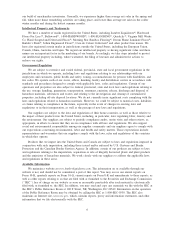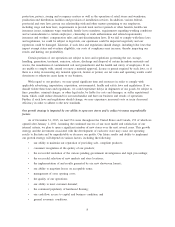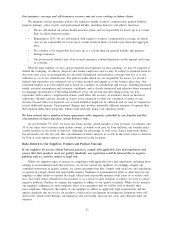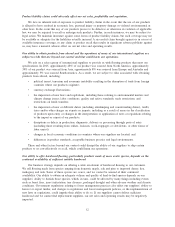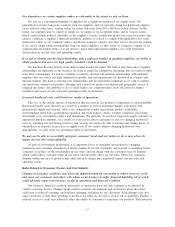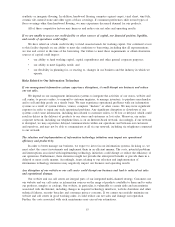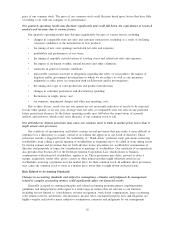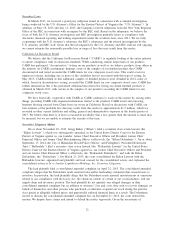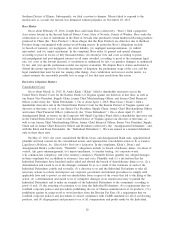Lumber Liquidators 2015 Annual Report Download - page 26
Download and view the complete annual report
Please find page 26 of the 2015 Lumber Liquidators annual report below. You can navigate through the pages in the report by either clicking on the pages listed below, or by using the keyword search tool below to find specific information within the annual report.We may incur costs and losses resulting from security risks we face in connection with our electronic
processing, transmission and storage of confidential customer information.
We accept electronic payment cards for payment in our stores and through our call center. In addition,
our online operations depend upon the secure transmission of confidential information over public networks,
including information permitting cashless payments. As a result, we may become subject to claims for
purportedly fraudulent transactions arising out of the actual or alleged theft of credit or debit card information,
and we may also be subject to lawsuits or other proceedings relating to these types of incidents. Further, a
compromise of our security systems that results in our customers’ personal information being obtained by
unauthorized persons could adversely affect our reputation with our customers and others, as well as our
operations, results of operations and financial condition, and could result in litigation against us or the
imposition of penalties. A security breach could also require that we expend significant additional resources
related to the security of information systems and could result in a disruption of our operations, particularly
our online sales operations.
Additionally, privacy and information security laws and regulations change, and compliance with them
may result in cost increases due to necessary systems changes and the development of new administrative
processes. If we fail to comply with these laws and regulations or experience a data security breach, our
reputation could be damaged, possibly resulting in lost future business, and we could be subjected to
additional legal risk as a result of non-compliance.
Risks Related to Our Personnel
Our success depends substantially upon the continued retention of certain key personnel.
We believe that our success has depended and continues to depend to a significant extent on the efforts
and abilities of our senior management team and other key personnel. The loss, for any reason, of the services
of any of these key individuals and any negative market or industry perception arising from such loss, could
damage our business and harm our reputation.
We announced the appointment of John M. Presley as our chief executive officer in November 2015.
Mr. Presley replaced Thomas D. Sullivan, who had been serving as acting chief executive officer since
Robert M. Lynch’s resignation in May 2015. Earlier in 2015, we appointed Gregory A. Whirley, Jr. as our
interim Chief Financial Officer to replace Daniel E. Terrell, who had served as our Chief Financial Officer
since October 2006. Also in 2015, we integrated the leadership of our merchandising and marketing
departments and promoted Marco Q. Pescara from Chief Marketing Officer to Chief Merchandising and
Marketing Officer. Any significant leadership change or executive management transition involves inherent
risk, and we could experience disruptions in our executive management transition, or any executive
management transition that may occur in the future, which could hinder our strategic planning, execution and
future performance.
Our success depends upon our ability to meet our labor needs.
Our success depends in part on our ability to attract, hire, train and retain qualified managers and
associates. Buying hardwood flooring is an infrequent event, and typical consumers have very little knowledge
of the range, characteristics and suitability of the products available to them before starting the purchasing
process. Therefore, consumers in the hardwood flooring market expect to have sales associates serving them
who are knowledgeable about the entire assortment of products offered by the retailer and the process of
choosing and installing hardwood flooring. As a result, competition for qualified store managers and sales
associates among flooring retailers is intense. We may not succeed in attracting and retaining the personnel we
require to conduct our current operations and support our potential future growth. In addition, as we expand
into new markets, we may find it more difficult to hire, motivate and retain qualified employees.
Although none of our employees are currently covered under collective bargaining agreements, we cannot
guarantee that our employees will not elect to be represented by labor unions in the future. If some or our
entire workforce were to become unionized and collective bargaining agreement terms were significantly
different from our current compensation arrangements or work practices, it could have a material adverse
effect on our business and operating results.
16


